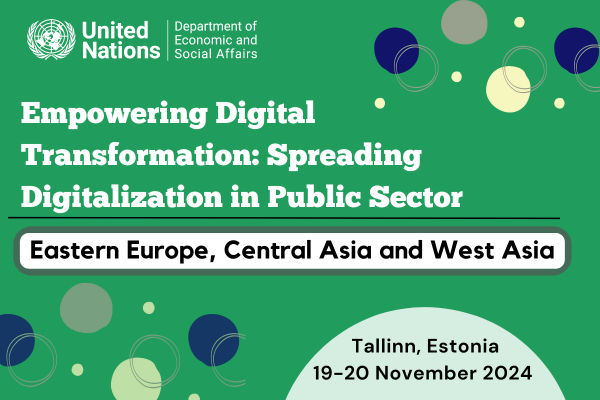Over the past decade, especially after the COVID-19 pandemic, the Governments have given a growing importance and priority to digital transformation, resulting in more people benefiting from the efficiencies and conveniences of digital government services, reflected in the findings of the 2024 UN E-Government Survey. Countries gradually improve the overall e-government development by investing in telecommunications infrastructure, online services delivery, and extended access to public information.
At the same time, as the Survey indicates, the disparities and digital divides remain significant within and between the regions, especially among countries in special situations: the least developed countries (LDC), landlocked developing countries (LLDC) and small island developing states (SIDS). Disparities are more pronounced in unevenly developed legislative frameworks supporting e-government development, in limited level of online services digitalization, and in the practices of e-participation. For instance, more than half of the countries in Asia and Europe already have relevant legislation, policies, or strategies for e-government development. The average number of countries with similar legislations in the Americas region is slightly above 30 per cent, in Africa slightly below 30 per cent, and in Oceania the compliance rates for necessary legislations range from 4 to 11 per cent .
Likewise, disparities are significant in the level of full digitalization of online services. For many types of services, the government portals provide information and often supply forms to fill out, but one still needs to appear in person to complete transactions. Registering a business online, for example, is fully digitalized in half of the UN Member States, 41 per cent of LLDCs, 38 per cent of SIDS, and 20 per cent of LDCs. Further, the number of countries providing information and services that target specific vulnerable populations has decreased by an average of 5 per cent since 2022 with the sharpest decline (13.5 per cent) recorded for service provision to immigrants. The provision of services for women and people living below the poverty line has also declined by 9 and 8.3 per cent, respectively.
This highlights a critical need for targeted efforts and support to enhance e-government capabilities in each of the regions, ensuring that digital transformation can contribute effectively to sustainable development and improved public services.
The objectives of the Workshop:
In this context, UN DESA’s Division for Public Administration and Digital Government (DPIDG) is organizing a 2-day long workshop on “Empowering Digital Transformation: Spreading Digitalization in Public Sector in Eastern Europe, Central Asia, West Asia” on 19-20 November 2024 in Tallinn, Estonia in collaboration with the Government of Estonia, under the umbrella of the Tallin Digital Summit (TDS). The objectives of the workshop are to empower the governments and their counterparts in select countries to apply the methodology of the UN E-Government Survey for conducting regular self-assessments of online services provision using the toolkit (OSI methodology) developed by UN DESA.
The primary thematic areas of the Workshop are as follows:
The participants will focus on discussing (i) the key findings of the UN E-Government Survey at global, regional and local levels, with a particular focus on challenges and opportunities faces by LLDCs; (ii) the national strategies for digital development and (iii) the methodologies and tools to self-assess e-government development in their respective countries.
 Welcome to the United Nations
Welcome to the United Nations
